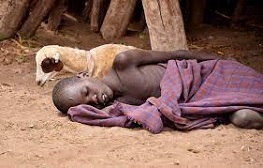Several infectious diseases in Africa, including malaria, cholera, and measles, have all witnessed upsurges recently due to complex interactions including changing climatic conditions, human encroachment into wild places, an increased burden on infrastructure as well as increasing population movement.
“We are witnessing a substantial rise in the spread of these diseases, among others,” says Dr Chris van Straten, Global Health Advisor Clinical Governance, at International SOS. “And it’s not just locally, but globally. Will we continue to see a rise of potentially deadly infectious diseases? Absolutely. Which is why we must ensure we are prepared and able to detect and mitigate these risks.”
“There are different factors contributing to the rise of infectious diseases. Climate change is a big one: warmer temperatures and changing climatic conditions can accelerate the spread of disease-carrying vectors. Climate change is also causing a disruption in rainfall patterns – and we have seen how heavy rains and flooding can damage sanitation systems creating the “perfect storm” for cholera to spread. In certain countries, a weak public health infrastructure can further contribute to the problem when there is limited capacity for detection, control and mitigation measures to be in place,” says Dr van Straten.
In South Africa, there was a significant increase recently in malaria cases within its endemic Northern provinces and Gauteng. There has also been outbreaks of cholera in parts of Gauteng, echoed by elevated outbreaks in Mozambique and Zimbabwe as well as parts of East Africa caused by heavy flooding due to seasonal rains and tropical cyclones.
A measles outbreak has also been declared in all the provinces in South Africa except for the Eastern Cape, and while there is an effective vaccine for measles, the uptake has unfortunately been significantly disrupted by the impact of the COVID-19 pandemic. Many children did not receive their full set of childhood vaccines during the COVID-19 pandemic.
Dr van Straten notes that increasing epidemic-prone diseases can have significant implications for communities, businesses operating in the region, and the overall African economy. A disease outbreak could weaken healthcare systems and result in increased healthcare costs – which negatively impact the economy. For businesses, this could mean that their greatest asset could be at risk, i.e. their workforce. Unwell employees coupled with a disruption to supply chains could severely impact productivity and business continuity.
Malaria risk
According to Dr Anita Soni, Coordinating Doctor for Medical Assistance at International SOS, while malaria can be deadly – causing over 590,000 deaths in Africa in 2021 – it is preventable and curable, especially with early diagnosis and treatment.
Dr Soni shares that International SOS proposes an ABCDE model for malaria prevention and treatment among its own employees and its clients’ travellers. “A is for the awareness of malaria risk, which entails education. B is for bite prevention, using the correct insecticides. Then we have C for chemoprophylaxis, which is a powerful tool in the prevention of malaria. Using the correct medicine, in the right way, at the right time, can reduce malaria’s danger significantly.
“The D stands for diagnose it early, to begin treatment before it becomes critically dangerous. Finally, E is for emergency standby treatment kits, which contain the necessary medicine to fight the disease, and should always be kept on hand for those who travel in malaria endemic areas,” she says.
Cholera and measles conundrum
Cholera is a different type of challenge, explains Dr Kety Guambe, Deputy Medical Director, Mozambique, at International SOS. She points out that according to the World Health Organisation (WHO), there are some 1.3 to 4 million cases of cholera annually, with between 21 000 and 143 000 deaths.
“What makes cholera so challenging is that it is an acute diarrhoeal disease, and can kill within hours if left untreated,” she says. “Symptoms can develop suddenly – within hours to five days after infection – and can lead to severe dehydration through vomiting or diarrhea, which can cause death. Travellers can often confuse the symptoms for a stomach bug, hence why early diagnosis is so important. If you are visiting a high-risk region, you should consider vaccination if available.”
When it comes to measles, Dr van Straten suggests that it seems strange to still be talking about it as a killer disease in the 21st century.
“While there is an effective vaccine for measles, it remains a highly contagious viral disease, that can be severe or even fatal. This is highlighted by the WHO estimates that indicate that in 2021, there were around 128 000 measles deaths globally, mostly of unvaccinated children under the age of five,” he says.
The COVID-19 pandemic impacted the number of people able to get their children to a healthcare facility for their standard childhood vaccines, including the measles shot, he adds. “It is important that if you or your child skipped a vaccine shot during this period, that you urgently get your vaccinations up to date.”
“Something that is worth noting is that infectious diseases are likely to increase, which will undoubtedly have a knock-on effect on public health at large. In fact, research suggests that the annual probability of extreme epidemics occurring could increase significantly in the coming decades, possibly causing significant economic and financial distress. It is imperative that companies in Africa start planning now. Intelligent leaders are looking at the lessons learnt from the COVID-19 pandemic and preparing themselves so that when an emergency happens, they can immediately and effectively react and ensure the health of their employees,” he concludes.
In 2021, Africa was home to 95% of malaria cases and 96% of malaria deaths. Children under 5 accounted for about 80% of all malaria deaths in Africa, according to the World Health Organization (WHO).

